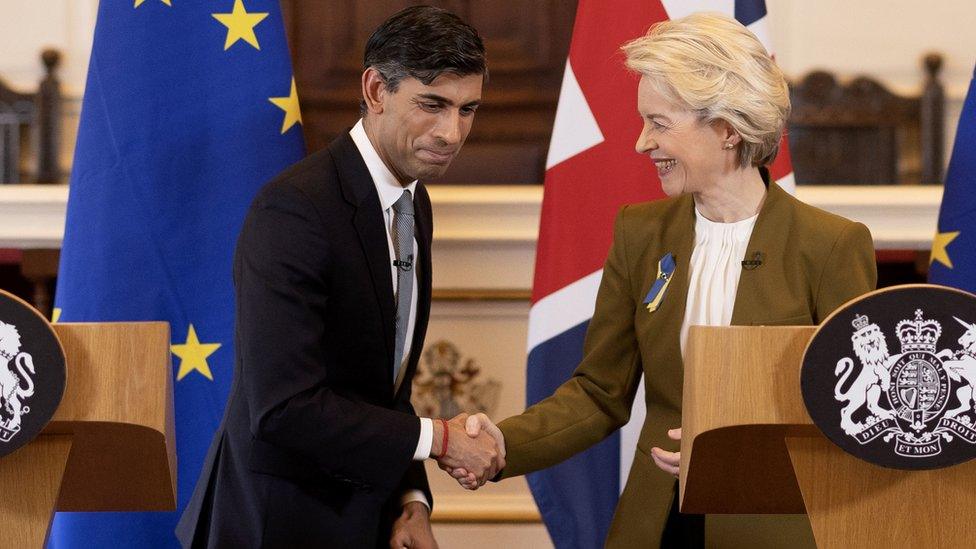DUP: Sir Jeffrey Donaldson tells conference 'power-sharing is essential'
- Published
Sir Jeffrey Donaldson: 'Power-sharing is essential' for Northern Ireland
Power-sharing is "essential" for securing Northern Ireland's future within the UK, the DUP leader Sir Jeffrey Donaldson has said.
Party members gathered in Belfast to hear him address their annual conference.
The DUP walked out of Northern Ireland's power-sharing government 18 months ago in protest at post-Brexit trade rules.
However, Sir Jeffrey said he still believes in devolved government.
"Having no say in our future will not be a recipe for success," he told delegates.
"If we want to make the positive case for the union, then having local institutions that succeed in delivering for everyone in Northern Ireland is an essential element in building our case."
The party withdrew Paul Givan as first minister in February last year in protest over the Northern Ireland Protocol, which triggered the collapse of power-sharing government.
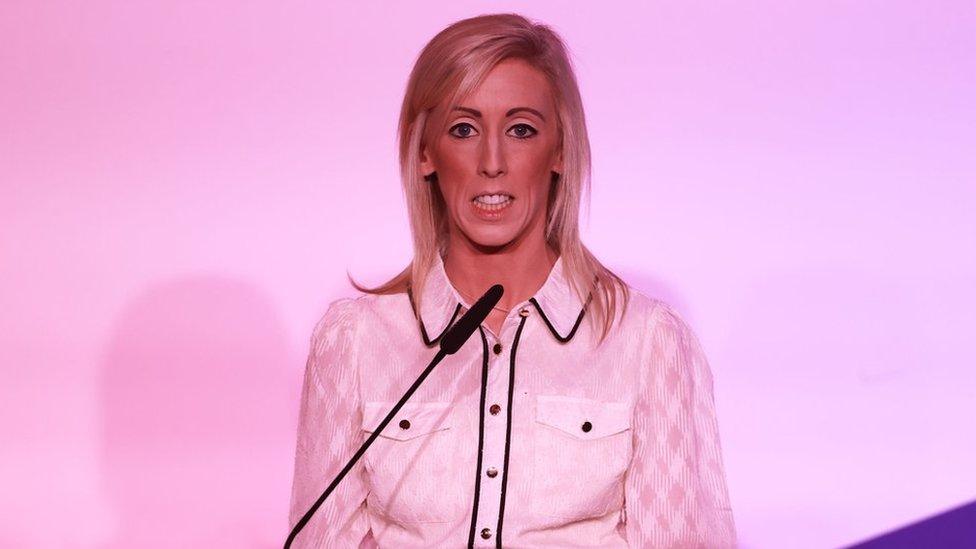
Carla Lockhart speaking the DUP's annual conference
Earlier this year, the UK and EU agreed changes to the protocol, as part of a deal known as the Windsor Framework.
It reduces the level of checks on goods crossing the Irish Sea from Great Britain to Northern Ireland.
The DUP has since said the framework is not sufficiently different from the protocol and continues to undermine Northern Ireland's place in the UK.
It has been involved in talks with Number 10 for several months in a bid to reach an accommodation, with NI Secretary Chris Heaton-Harris recently saying he believes those negotiations are in their "final stages".
Leader opposed to direct rule
Sir Jeffrey updated members on his negotiations with the government over changes they want to see to the Windsor Framework.
"Today I can report that we are making progress, but there remains more work to do.
"I am hopeful that remaining concerns can be addressed as quickly as possible."
And he sent a message to those who would argue that direct rule from London is a "better option".
"Time and again, Westminster has imposed laws upon us that are not in tune with the needs or wishes of the people of Northern Ireland," he said.
"You cannot on the one hand repeatedly condemn successive governments for letting us down and then argue with credibility that we are better off ruled directly by those who do not really understand what makes this place tick."
Sir Jeffrey also said the DUP's plan had "confronted the realities and exposed the flaws" of the protocol, and that any new arrangements must command the support of unionists and nationalists.
"The rights of unionists cannot be diminished, sidelined or treated in a way that is less important than nationalists," he added.
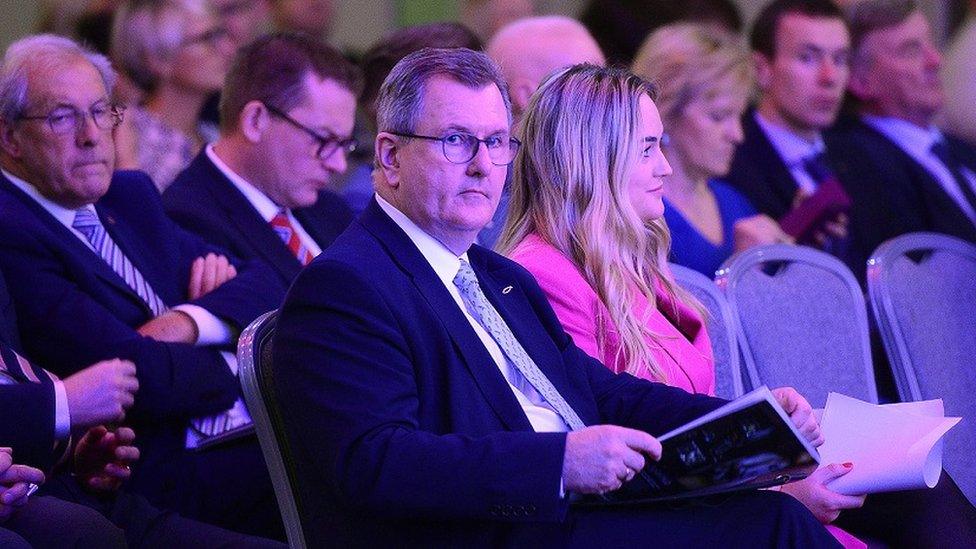
The DUP has faced criticism from other political parties in NI over its refusal to return to power sharing
The DUP has faced criticism from other political parties for blocking the formation of an executive and assembly.
But the party's stance has remained unchanged, instead negotiating with the UK government with the aim of securing more legislative changes that it says would protect Northern Ireland's place within the UK internal market.


On the surface, it was a speech which ticked all the familiar boxes: standing up for the union and facing down those pushing for a united Ireland.
But scratch the surface and you will find a speech which appeared to lay the first small step towards a return to Stormont.
The narrative was easy to follow. Protecting the union was the priority and the best way to achieve that was through devolved government at Stormont.
Delegates were invited to consider the bigger picture.
"If we make the right choices now we can secure the union for generations to come," said the DUP leader.
But that could come at a price which was spelt out in the next line: "But that means being prepared to face up to new realities and adapting to new circumstances."
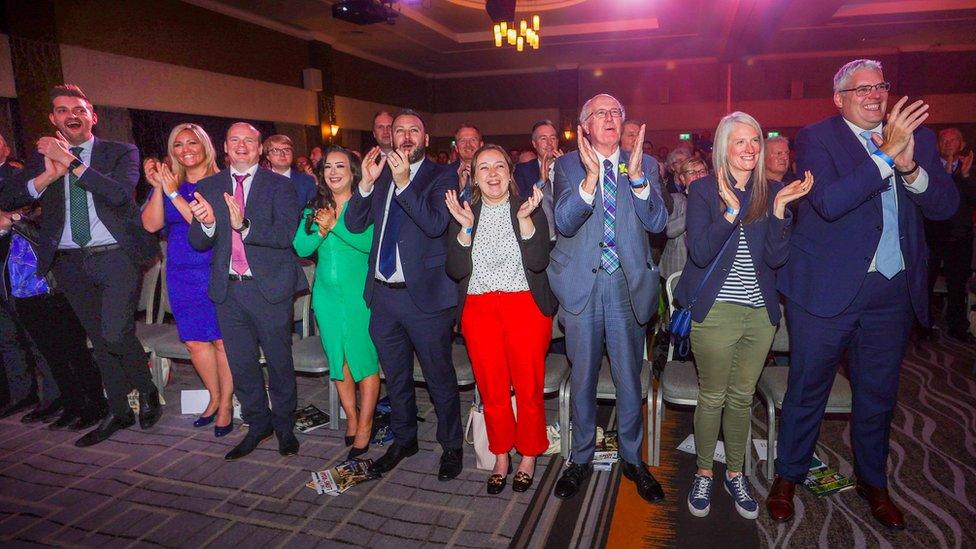
The DUP leader received a standing ovation from party representatives at the conference
Does that mean unionists being forced to stomach some sense of an Irish Sea border?
Not according to Sir Jeffrey who insisted the party will "not be afraid to say no" if any government offer does not deal with the DUP's "fundamental concerns".
But while those in the conference hall were left to ponder on the leader's next move, those watching in London will be encouraged by what they heard.
They were waiting for a signal from the DUP leader about a possible return to Stormont.
They got that today which, in turn, may pave the way for London and Brussels to provide Sir Jeffrey with what he needs to get a deal over the line in the coming weeks.
It feels like the pieces of a jigsaw are falling into place, but we have been here before and know how quickly such jigsaws can fall apart.

Sir Jeffrey, who is the MP for Lagan Valley, became leader in June 2021.
Earlier this year he hit out at some within his own ranks for briefing against the party, saying it damages unionism's electoral prospects.
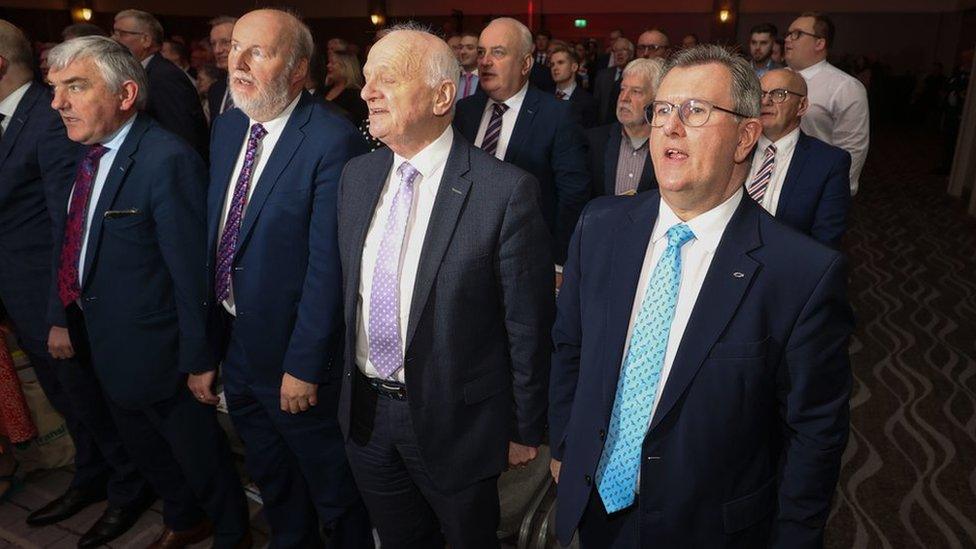
Attendees stood and sang the national anthem
He told the conference that: "With leadership comes responsibility, and with that responsibility comes days when the challenges will be greater than others.
"We must collectively step up our efforts in promoting the union.
"Those who believe that a united Ireland is around the corner, that it is inevitable, and that Northern Ireland within the union will cease to exist are entirely wrong."
- Published14 October 2023
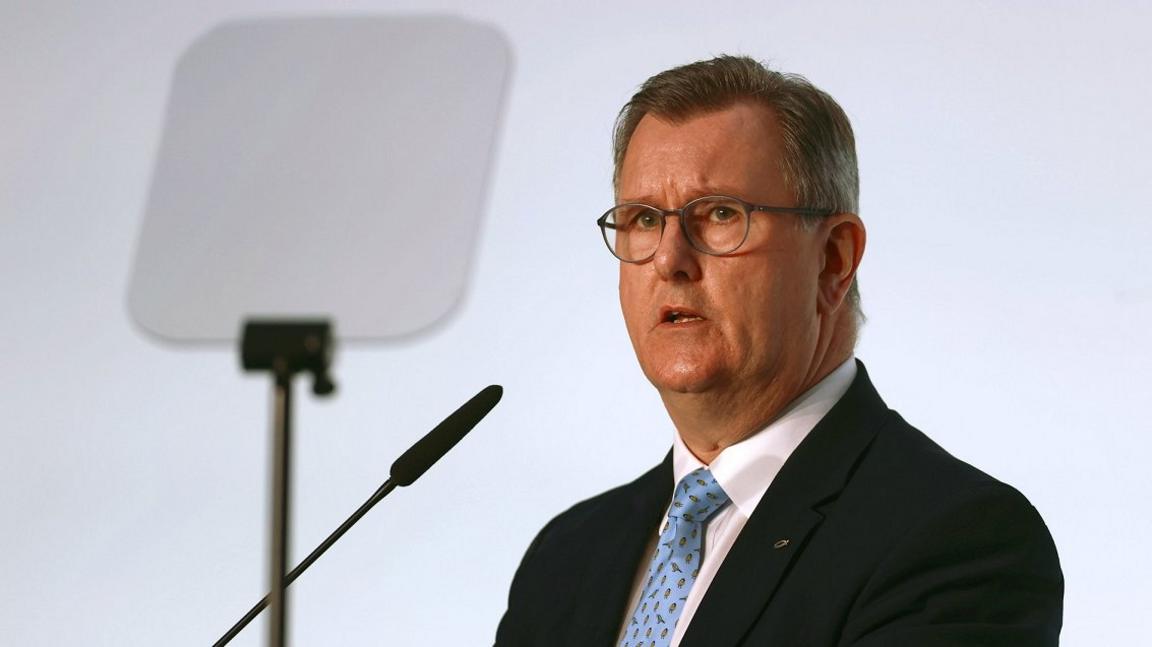
- Published2 August 2023
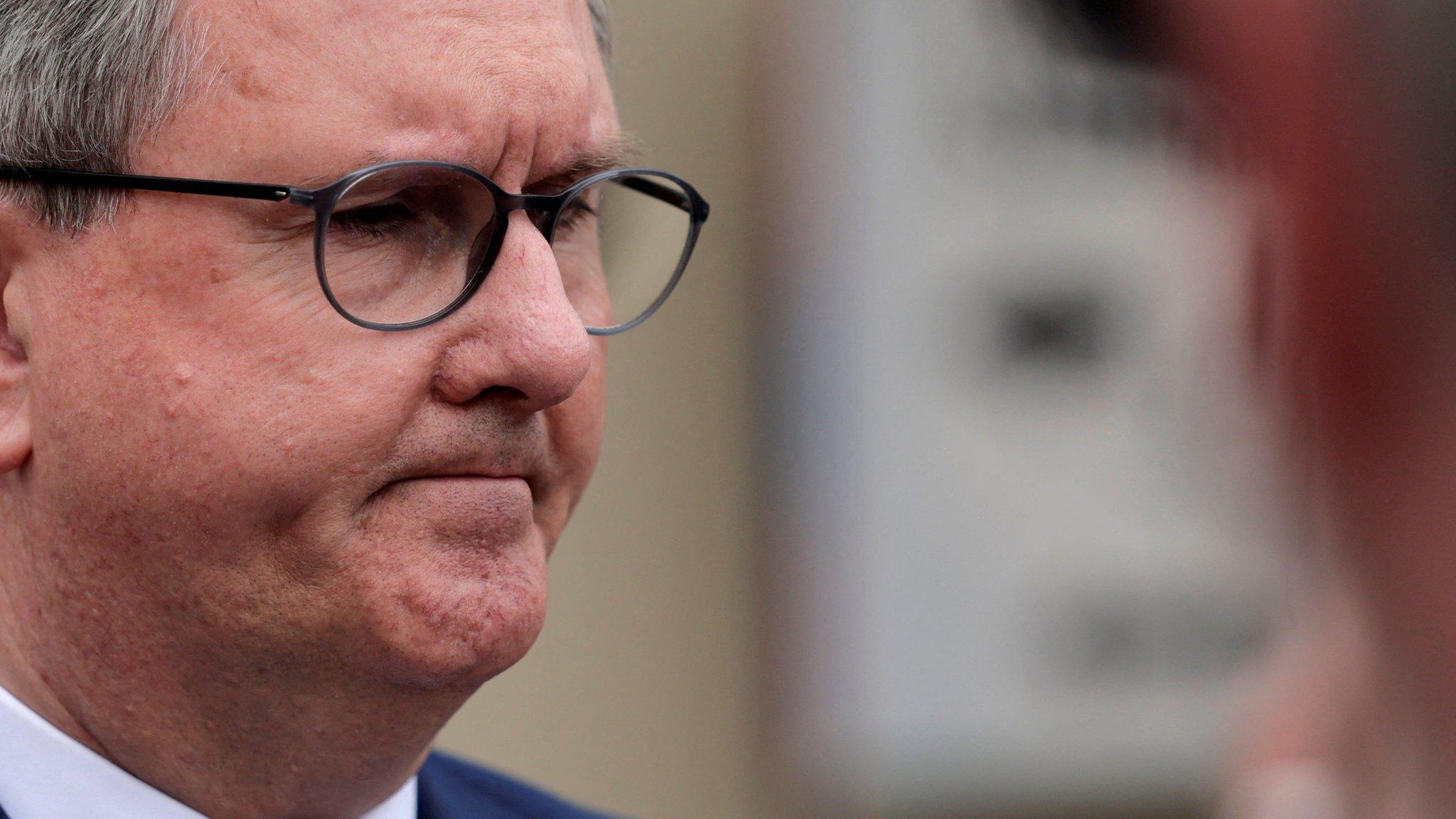
- Published30 June 2021
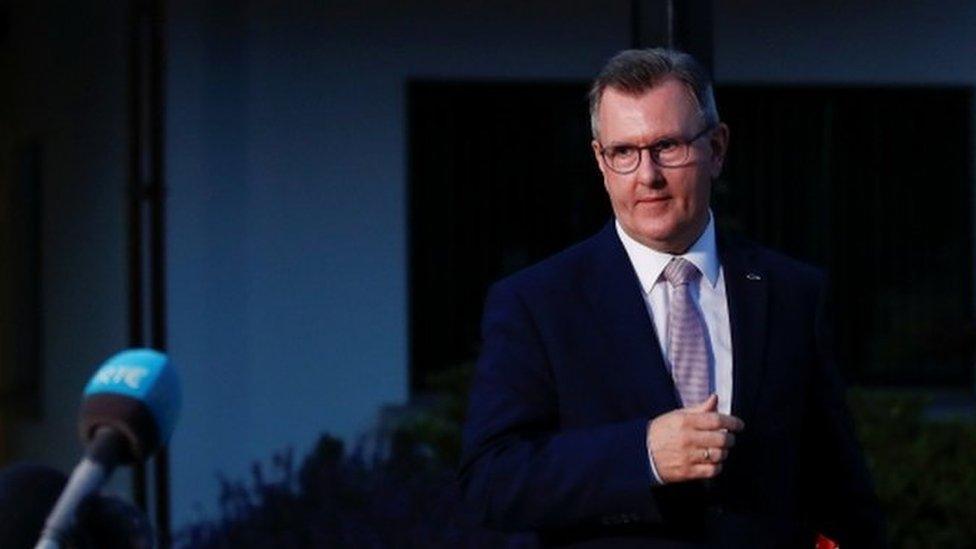
- Published1 October 2023
